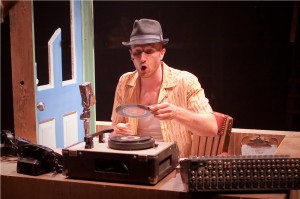Rousing MEMPHIS at Toby’s Proves You Can Do Worse Than Be Formulaic
Theater Reviews Page | Previous Theater Review | Next Theater Review
Rousing MEMPHIS at Toby’s Proves You Can Do Worse Than Be Formulaic
Posted on BroadwayWorld.com September 16, 2014
So far as I know, Toby’s staging of Memphis: The Musical is the first local production to date in the Baltimore area, certainly one of the first, and a worthy introduction of the show to the region. It seems to have everything that the Broadway show has: fiery, precise dancing, tuneful belting of catchy songs, great period costumes. In other words, a sure-fire great time, as one would expect for a musical that, on Broadway, won the Tony for Best Musical, Best Score, and Best Book.
The show did have its critics when it first came out in 2010. Charles Isherwood of the New York Times described Memphis as “ slick but formulaic entertainment.” I think the formulas he had in mind were Hairspray (rock and roll as the great mingler of races in the Fifties and Sixties), Dreamgirls (the rise of female black singers), and any number of dramatizations of the lives of charismatic but self-destructive entertainment figures (many of them dramatized on the screen rather than the stage), and possibly a touch of A Star Is Born (the rise of one entertainment figure while another tanks), and maybe even some Bye-Bye Birdie (affectionate fun poked at bobby-soxers). However, the reader will have doubtless noted that these are some pretty good patterns, and that, as applied to the tale of an iconoclastic white DJ in love with a black singer in the segregation-era South, they’re likely to fit together in unpredictable ways. Indeed, my companion remarked to me that thematically the show was a bit overstuffed. To which my response was that the messiness of all these themes interacting was refreshing. Yeah, you can sort of plot where it’s likely to go, but that’s true of Shakespeare too. The Tonys it earned notwithstanding, one can agree this show is not a pinnacle of the musical theater, but it is solid entertainment.
The story, if you don’t already know, concerns a white DJ named Huey Calhoun (Craig Twomey), (reportedly based loosely on a Memphis DJ named Dewey Phillips), who, exploiting his natural personality as a super-cracker, nonetheless pioneers racially integrated playlists at white stations and eventually fronts a black-oriented show where, as in Hairspray, local teens dance to the latest hits. And it concerns Felicia, an aspiring black singer (Ashley Lauren Johnson), who may be in love with Huey but quite reasonably worries about the price she’ll have to pay in a violently-segregated city if their love becomes known. Their communities, personified by Felicia’s highly protective brother Delray (Sayne-Khayri Lewis) and Huey’s somewhat bigoted though educable mother Gladys (Lynne Sigler), are trying to pull them apart while the music industrial machine personified by radio station owner Mr. Simmons (Robert John Biedermann 125), is continually resisting while Huey, a natural who never loses confidence in himself, pushes his outrageous racial and musical mixing undiscouraged. That all does not end well is a given with personalities like these; that Huey is on the side of history we also know. Working to the uneasy compromise between these two dynamics is all we really ask of the plot, and we get it.
What propels this production, in addition to a tight musical ensemble under the direction of Ross Scott Rawlings, and Christen Svingos’ choreography, is the top-to-bottom superb cast. Critical, of course, is Huey, and in Craig Twomey the directors (Toby Orenstein and Lawrence B. Munsey) have the perfect specimen. It’s been awhile since I saw the Broadway version, but it seems to me Twomey has Chad Kimball’ s (the original Huey) moves and look down, moving like some kind of long-legged flightless bird. As Felicia, Audrey Lauren Johnson has one fundamental job, to deliver r&b coloratura, and she does it just fine. And there are a couple of very nice performances from the second-tier characters, Tobias Young as a hefty young man somewhat shocked by his own musical and dancing talent and Lynne Sigler, whose Gladys celebrates her emancipation from bigotry with a number that starts out white gospel and ends up the black variety.
And now for a criticism. Toby’s is dinner theater, with all the good and bad that that entails. One of the worse things, and one Toby’s, at this stage of its artistic accomplishment, could surely do without or at least with less of, is the chat by a cast member with the audience before the proceedings begin. At best, these are part of the entertainment, sort of a warmup act. But the current designated ambassador, Mr. Biedermann, goes on far too long and far too insultingly in a Don Rickles vein, as people’s birthdays and anniversaries are acknowledged. We may laugh, but it’s not a happy laugh, and we are all waiting with mounting impatience, long after the designated curtain time, for the real entertainment to begin. A ritual that could take two minutes (a la Prairie Home Companion) destroys the better part of a quarter hour. When it comes to this aspect of the performance, Toby’s should internalize the message that less is more.
Instead, Toby’s should focus on what it does so well: getting on with the show.
Copyright (c) Jack L. B. Gohn, except for production photo
Theater Reviews Page | Previous Theater Review | Next Theater Review
